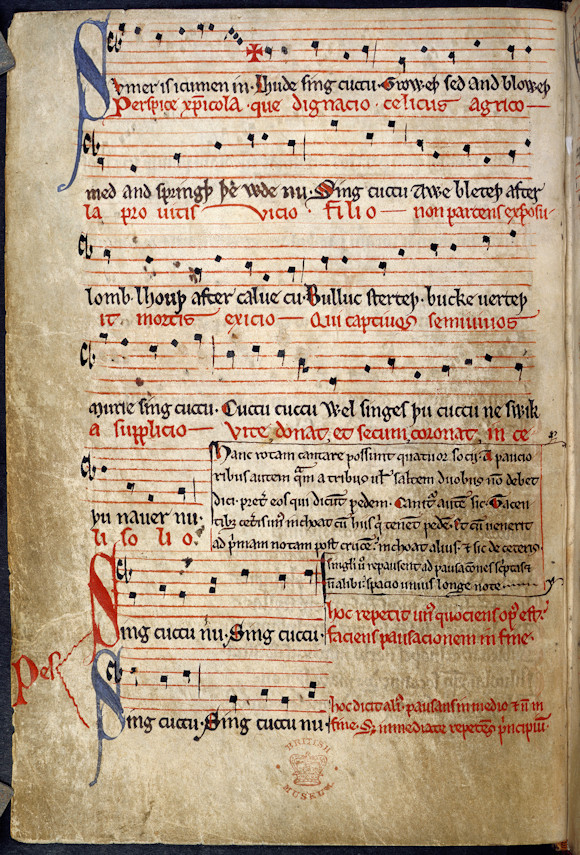The medieval English Cuckoo round
The preserved manuscript of this song was copied around 1261. Although the composer is not known it was possibly written by W. de Wycombe (William of Winchcombe) or perhaps a monk at Reading Abbey. It is the oldest known music featuring six-part harmony.
The musical form is a Rota (latin: "Wheel") a type of Round. If you look carefully at the manuscript you will see a red cross indicating when the next voice (starting at the beginning) should enter. Instructions are written in Latin in the box beginning 'Hanc rotam cantare...' here is the translation:
Four companions can sing this round. But it should not be sung by fewer than three, or at the very least, two in addition to those who sing the pes. This is how it is sung. While all the others are silent, one person begins at the same time as those who sing the ground. And when he comes to the first note after the cross (which marks the end of the first two bars), another singer is to begin, and thus for the others. Each shall observe the written rests for the space of one long note, but not elsewhere.
The 'Pes' seen at the bottom is a two-part ostinato (repeated backing)
The words or the song are written in the Wessex dialect of Middle English.
The Middle English word 'sumer' is the root of the modern 'summer'. However, the original meaning of 'sumer' was a longer period that includes at least a good period of our modern-day Spring.
Here is a translation of the words...
 Sumer is icumen in (c.1261)
Sumer is icumen in (c.1261)
Middle English
Sumer is icumen in
Lhude sing cuccu
Groweþ sed
and bloweþ med
and springþ þe wde nu
Sing cuccu
Awe bleteþ after lomb
lhouþ after calue cu
Bulluc sterteþ
bucke uerteþ
murie sing cuccu
Cuccu cuccu
Wel singes þu cuccu
ne swik þu nauer nu
Sing cuccu nu • Sing cuccu.
Sing cuccu • Sing cuccu nu
Modern English
Summer (including Spring) has arrived,
Loudly sing, cuckoo!
The seed is growing
And the meadow is blooming, (or blowing)
And the wood is spinging into leaf now,
Sing, cuckoo!
The ewe is bleating after her lamb,
The cow is lowing after her calf;
The bullock is prancing, (or stirring)
The buck farting, (or the Stag cavorting)
Sing merrily, cuckoo!
Cuckoo, cuckoo,
You sing well, cuckoo,
Never stop now.
Sing, cuckoo, now; sing, cuckoo;
Sing, cuckoo; sing, cuckoo, now!
Here is my transcription into modern notation
And here is a performance by the Hilliard Ensemble
